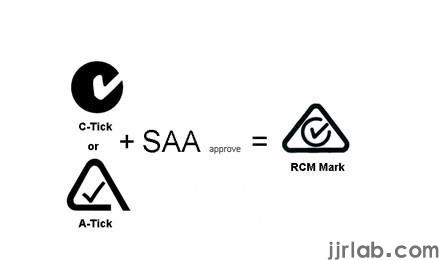
RCM Certification Australia and New Zealand
Since March 1, 2016, Australia and New Zealand have officially introduced the rcm mark (excluding New South Wales), aiming to achieve a unified identification of electrical products. This mark is a trademark owned by regULatory authorities in Australia and New Zealand, indicating that the products comply with both safety and EMC requirements. saa certification and c-tick certification will be gradually phased out.

1. Safety Certification:
Safety certification for electrical products includes two parts: regulated electrical products and non-regulated electrical products.
1. Regulated electrical products are classified according to AS/NZS4417.2 and include electric heating devices, refrigeration equipment, power tools, components, etc. Regulated electrical appliances must obtain a certificate issued by the regulatory authority and must be labeled with the certificate number. The first letter of the certificate number indicates which state or region issued the certificate.
2. Non-regulated electrical appliances can be sold without certification, but manufacturers must ensure that the electrical safety of the products complies with the Australian standard AS/NZS3820:1998 (Essential Safety Requirements for Low Voltage Electrical Equipment); the regulatory authority will issue a compliance certificate for products that meet the standard requirements. Electrical products with compliance certificates can be labeled with the certificate number, and the last letter of the certificate indicates which state or region issued the certificate.
2. EMC (Electromagnetic Compatibility):
Australia's emc compliance program is based on the 1992 Radiocommunications Act and covers a wide range of products. The program classifies products into three categories based on the degree of electromagnetic interference they generate, and second and third category products must be registeRED in the national database. However, regardless of the category, all products must comply with relevant EMC standards.
GEMS (Energy Efficiency) Registration:
To improve energy efficiency of electrical equipment and products in various industries, Australia and New Zealand have issued the Greenhouse and Energy Minimum Standards Act (GEMS), which came into effect on October 1, 2012, and replaced the previous Australian Energy Efficiency MEPS certification after a transition period ending on September 30, 2013. The new GEMS regulations not only cover previous major policies such as Mandatory Energy Performance Standards (MEPS), Energy Rating Labeling Scheme (ERLS), and Equipment Energy Efficiency Program (E3), but also extend energy efficiency requirements to reducing greenhouse gas emissions and enhancing energy utilization efficiency. GEMS certification is mandatory, and products within regulatory control must have GEMS certification to be sold on the market.
Advantages of Certification
Australia and New Zealand have a mutual recognition agreement, so all products certified in Australia can smoothly enter the New Zealand market. In Australia and New Zealand, the majority of consumers are familiar with energy efficiency labels and rely on the information provided by these labels to decide whether to purchase appliances.
Certification Process in Australia and New Zealand
RCM Certification Process:
1. Third-party laboratories evaluate products and determine the testing standards to be applied.
2. If any non-compliance is found during testing, the laboratory will rectify the product to meet and comply with Australian standards.
3. Upon successful testing, a testing report is issued.
4. The testing report is submitted to the Australian certification authority for document review.
5. Upon approval by the Australian authority, the rcm certificate is issued.
6. Customers can complete the registration on the Australian website by themselves or through the laboratory.
GEMS Registration Process:
1. Select products for testing, with testing standards consistent with the original MEPS certification. Generally, testing reports provided by ISO 17025 accredited laboratories are acceptable.
2. Submit testing reports and other documents for GEMS registration. Upon approval of the documentation, the GEMS certification certificate will be issued.
3. Products within the energy efficiency label range can only be sold in the Australia-New Zealand market after affixing the energy efficiency label according to the registration results.
CHCT Service Advantages
As a member laboratory of CB and an ISO 17025 accredited testing laboratory, jjrlab provides various testing, certification, and registration services for products exported to the Australia-New Zealand market. We offer one-stop solutions for RCM and GEMS certification, and guide customers in correctly applying relevant marks, providing comprehensive technical services for export enterprises to expand into the Australian market.
Email:hello@jjrlab.com
Write your message here and send it to us
 2026 EU SVHC Candidate List (253 Substances)
2026 EU SVHC Candidate List (253 Substances)
 LFGB Certification Cost and Timeline Guide
LFGB Certification Cost and Timeline Guide
 Bluetooth FCC Test Report
Bluetooth FCC Test Report
 Is FCC Testing Required?
Is FCC Testing Required?
 Where to Find FCC Test Reports
Where to Find FCC Test Reports
 Was kostet ein LFGB-Zertifikat
Was kostet ein LFGB-Zertifikat
 CE-Kennzeichnung für Kinderspielzeug
CE-Kennzeichnung für Kinderspielzeug
 CE-Kennzeichnung für Spielzeug beantragen
CE-Kennzeichnung für Spielzeug beantragen
Leave us a message
24-hour online customer service at any time to respond, so that you worry!




